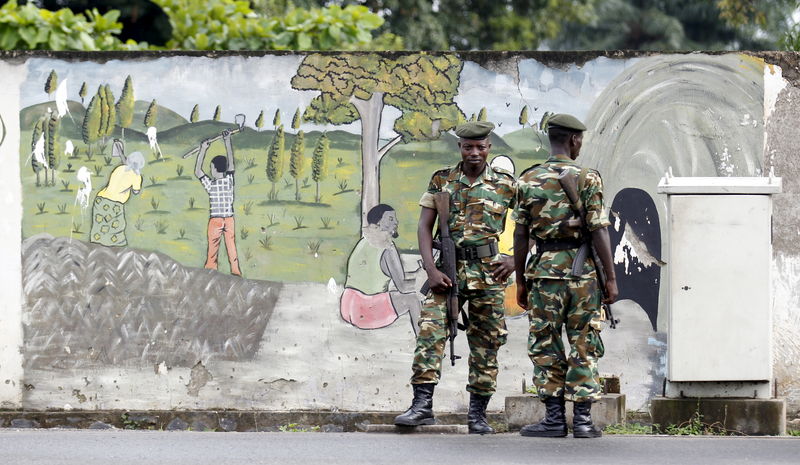By Edmund Blair
NAIROBI (Reuters) - Crowds cheered and hugged soldiers on the streets of Burundi's capital when a general announced he had sacked the president for seeking an unconstitutional third term, but celebrations were quickly quashed when another general said the coup had failed.
The crisis has highlighted alarming divisions in Burundi's patchwork military, a symbol of reconciliation as it absorbed one-time enemies that now risks being torn apart by rivalries in a nation still scarred by an ethnically fuelled civil war a decade ago.
President Pierre Nkurunziza's loyalists insist the coup was hatched by a small group of soldiers led by Major General Godefroid Niyombare, the intelligence chief who was sacked in February. Niyombare has insisted he has other generals with him.
Whether the U.S-equipped and trained army can heal rifts in its ranks or instead fractures further may determine Burundi's fate: a retreat from the brink or a slide back into conflict and ethnic massacres. Early indications are not encouraging.
Gunfire was heard on the streets of Burundi on Thursday, a day after the coup attempt. While police had slowly returned, it was unclear if the government had regained full control.
"Factional fighting between rival ethnic groups in the military and police is likely to erupt and increase the probability of a civil war," IHS country risk analyst Robert Besseling wrote as the coup attempt unfolded.
The repercussions would be felt beyond the borders of Burundi. It lies in a region where genocide tore Rwanda apart 20 years ago and where other presidents, such as Joseph Kabila in Democratic Republic of Congo, face term limits soon.
More than 70,000 people have already fled Burundi to neighbouring states.
"The region will not accept, nor will the region stand by, if violence does not stop or escalates in Burundi," Tanzanian President Jakaya Kikwete said, voicing regional concerns
at a summit of east African leaders on Wednesday, where they condemned the coup.
The military takeover had been following a well-rehearsed African script: protests erupted against the president, police and protesters clashed, the army moved in to calm the streets and a general stepped in to depose the leader.
But what worked in Egypt and Tunisia in 2011 and Burkina Faso 2014 has stumbled in Burundi, where the army's command structure and its ranks have been shaped around the bid to forge a single force from former rebels and professional troops.
"Everything hinges on the army," a senior diplomat who tracks the military said as the crisis was still brewing in Burundi. "Does it stay unified or does it split up?"
SPLITTING THE NATION
Burundi's civil war pitted the military, which at the time was led by the ethnic Tutsi minority, against rebel factions of the majority Hutus, the biggest of which was led by Nkurunziza.
Bujumbura was a key battleground, controlled by the army and frequently shelled by rebel fighters from the surrounding bush.
The nation remains split. Opposition groups boast of broad support in Bujumbura and some other cities, while the 51-year-old president has his main power base in the countryside.
The army, however, is now shared between Tutsis and Hutus, based on a deal hammered out in the Arusha peace process that ended 12 years of war and stopped decades of ethnic killings.
But strains appear to be showing as soldiers face a choice between supporting Nkurunziza, with whom some will have fought when he was a bush commander, or standing against him.
"Niyombare's move starkly highlights Nkurunziza's lack of unified support among his military chiefs," said Charles Laurie, Africa analyst at Verisk Maplecroft. "Even if Niyombare's attempt fails, Nkurunziza's political credibility may be damaged irreparably."
Opponents say the president's re-election bid violates the Arusha deal and the constitution, which set a two-term limit.
Nkurunziza points to a constitutional court ruling saying his first term, when he was picked by lawmakers not elected by popular vote, does not count. Critics say the court is biased.
Many Burundians, particularly minority Tutsis, worry that if he ignores one aspect of the Arusha deal he is threatening the rest of an agreement that has kept the peace, with measures such as outlining how power is shared between ethnic groups.
Until now, the struggle on the streets has been a battle for power not ethnic supremacy. Protests against the president, focused on Bujumbura, had included Tutsis and Hutus. Niyombare, who launched the coup bid, is a Hutu.
But the wounds of ethnic conflict remain raw.
Many of those who have fled Burundi to Rwanda are Tutsis. Rwandan President Paul Kagame has often promised not to allow a repeat of the 1994 genocide that tore his nation apart when 800,000 mostly Tutsis and moderate Hutus were killed.
If Tutsis were targeted, he could be drawn in.
"The security situation is very fluid," said Thierry Vircoulon, an expert with the International Crisis Group. "The opposition can be tempted to retaliate ... against the loyalists in the security forces. From both sides, you can have violence."
